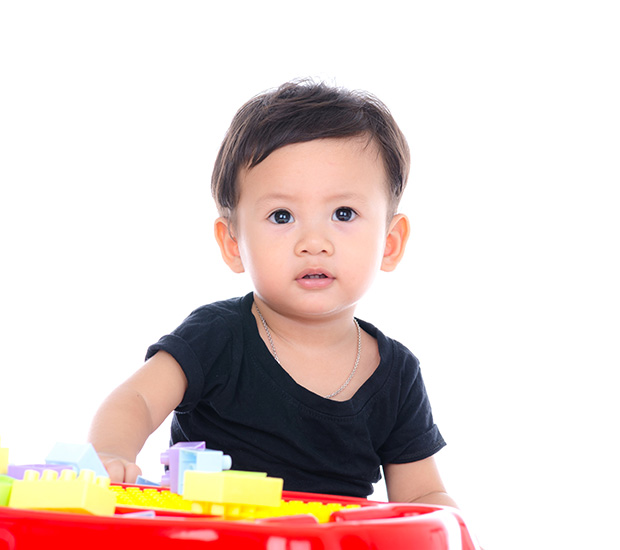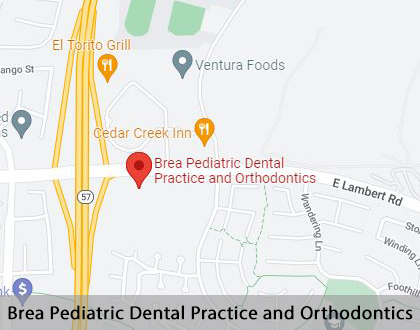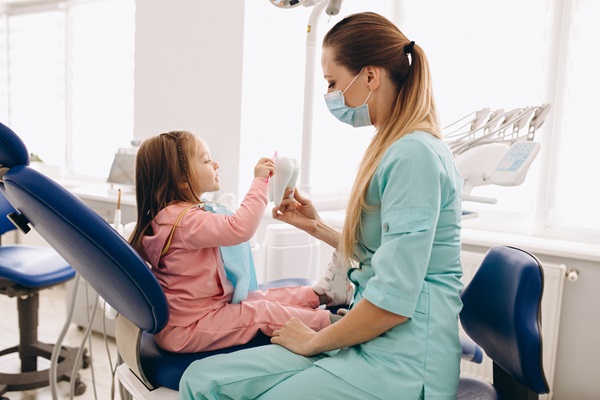Infant Dental Care Brea, CA
Watching your infant grow and develop is exciting. Just as it is essential to care for your child’s overall health, it is also important to care for their oral health from birth. A pediatric dentist can provide infant dental care that supports lifelong oral health.
Infant dental care is available at Brea Pediatric Dental Practice and Orthodontics in Brea and the surrounding area. Our team will provide your child with the gentle, quality care they deserve. Call us at (714) 782-0215 to learn more about our services or schedule an appointment.
Tooth Cleaning Techniques for Infants
There is a myth that brushing an infant’s teeth is not necessary until the parent weans them. The truth is that dental care should start from birth. Although baby teeth eventually fall out, they help guide the eventual placement of permanent teeth. Baby teeth also support a healthy diet and speech development. Unfortunately, baby teeth are prone to decay. Regular brushing is essential to combat cavities.
Once teeth erupt, use a small soft-bristled brush. Gently clean the teeth and brush the gums. Even if an infant does not have any teeth yet, parents must still clean their mouth daily using sterile gauze or a soft cloth. Dampen the cloth or gauze, then gently wipe the gums. Giving infants a small amount of water to rinse their mouths after feeding may also prevent decay. Parents should consult our team for proper cleaning techniques and tips to keep infants healthy and safe.
“Regular brushing is essential to combat cavities.”
Understanding Childhood Tooth Development
During infancy, teeth erupt slowly. The first tooth usually appears around six to seven months. Teeth typically appear at the front of the mouth first, while molars are often last to erupt and may not arrive until a child is two to three years old. Children will begin to lose their baby teeth by six to make room for permanent teeth. As the baby teeth fall out, permanent teeth shift into place. Wisdom teeth are last to arrive, and they usually turn up around age 18.
Discovering new teeth can be exciting for parents and children. During this time, it is beneficial to reinforce the importance of dental hygiene. Newly erupted teeth need special care. As new teeth appear, parents should speak with our team about any changes a child may need to make, such as brushing or flossing more often. They might also need to avoid certain foods.
“Teeth typically appear at the front of the mouth first, while molars are often last to erupt and may not arrive until a child is two to three years old.”
Diet and Baby Bottles
Parents often let their child use a bottle or the breast as a soothing toy before bedtime. While this may seem harmless, it is important not to put a child to sleep directly after feeding. When children sleep with formula or milk in their mouth, bacteria can thrive and cause tooth decay. Mouth bacteria produce acid, which damages tooth enamel. To avoid decay, children should not go to bed with a bottle or sippy cup. Parents must also brush or rinse out their child’s mouth.
If a child is fussy, we recommend giving them a clean pacifier rather than the breast or bottle. Parents may also want to consider weaning the child by their first birthday. Making an early switch from formula to food might help prevent tooth decay. Parents can speak with our team for more information on this issue.
“When children sleep with formula or milk in their mouth, bacteria can thrive and cause tooth decay.”
Check out what others are saying about our dental services on Yelp: Infant Dental Care in Brea, CA
Planning the First Dental Check-up
Once an infant’s first tooth has erupted, it is time for a dental visit. Parents should not hesitate to schedule an appointment. During the checkup, our team will examine the inside of the child's mouth, feel the gums, and examine new teeth. We will also ask questions about brushing habits, feeding, and pacifier use and provide parents with helpful tips about weaning or introducing solid food. Our team can also demonstrate brushing techniques and explain how to keep a child's teeth healthy.
Before leaving, parents will schedule another check-up for their child. While most children will have a regular check-up about every six months, some patients will require more frequent appointments depending on their oral health. These dental visits help children stay on track with their oral hygiene and develop a positive relationship with the dentist.
“Once an infant’s first tooth has erupted, it is time for a dental visit.”
Questions Answered on This Page
Q. How can parents keep their infant's mouth clean?
Q. When will a child's baby teeth erupt?
Q. How do diet and baby bottles affect baby teeth?
Q. When should parents schedule their child's first dental checkup?
Q. How can parents soothe their infant’s teething pain?
People Also Ask
Q. Why should I take my child to a pediatric dentist?
How To Handle Teething
Infants will generally start teething around four to six months of age. Parents may notice that their child is cranky, fussy, or irritable. Some may also develop swollen cheeks or gums and drool more than usual or do a lot of chewing on their favorite toys. These are all signs that another tooth is on the way.
Rubbing the gums with a clean finger can help soothe them. Parents can also offer something cold to chew on, such as a chilled teething ring or a dampened cloth is a good choice. Every infant is different, and some infants may start teething earlier or later than usual. Early or late teething usually is not cause for concern but may influence their dental care plan. Our team can provide a more precise timeline for each patient.
“Early or late teething usually is not cause for concern but may influence their dental care plan.”
Frequently Asked Questions
Q. Should my child see a pediatric dentist if their first tooth has not erupted yet?
A. If a child’s tooth has not erupted yet, they should begin dental visits by age one. Children who are behind on dental care should have an appointment scheduled right away. Let our team know that this will be their first dentist visit so we can determine what kind of care the child needs.
Q. When will my child start teething?
A. Most children begin teething around six to seven months old. Some children may start teething earlier or later. Symptoms of teething can include fussiness, drooling, swollen cheeks, and increased chewing. Let our team know about any concerns about the teething process.
Q. When will my child have all their baby teeth?
A. By age two or three, most children have all their baby teeth. These teeth shift into place slowly. Parents often notice that the front teeth appear long before the back molars show up. This pattern might seem irregular, but it is normal.
Q. How should I take care of my child's baby teeth?
A. As soon as baby teeth appear, begin brushing daily. Use a soft-bristled brush and work in circular motions. Once weaned, infants should have their teeth brushed twice a day. Most children need supervision with brushing and flossing, even once they reach school age.
Q. Why are routine check-ups necessary for children?
A. Regular check-ups and cleanings are an important part of a child's oral health. Children can develop cavities as soon as they develop teeth. Cleanings during these check-ups remove plaque and tartar, which reduces the risk of cavities and gum disease.
Quality Pediatric Dental Services Can Transform Smiles
By visiting us as soon as possible, our team can help get your child the professional treatment they need.
Definition of Pediatric Dental Terminology
Call Us Today
Infant dental care from a pediatric dentist can help children develop and maintain good oral health and hygiene habits. Our team at call Brea Pediatric Dental Practice and Orthodontics is here to support the healthy development of your child’s smile. Call us at 714-782-0215 to learn more about our services or schedule an appointment.
If you live in the Brea area, call 714-782-0215 for an appointment in our Brea office.
Helpful Related Links
- American Dental Association (ADA). Glossary of Dental Terms. 2021
About our business and website security
- Brea Pediatric Dental Practice and Orthodontics was established in 2008.
- We accept the following payment methods: Cash, Check, Discover, MasterCard, and Visa
- We serve patients from the following counties: Orange County, San Bernardino County and Los Angeles County
- We serve patients from the following cities: Brea, Yorba Linda, Placentia, Fullerton, La Habra, Whittier, Anaheim, Chino, Diamond Bar, and Rowland Heights
- Norton Safe Web. View Details
- Trend Micro Site Safety Center. View Details
Back to top of Infant Dental Care







